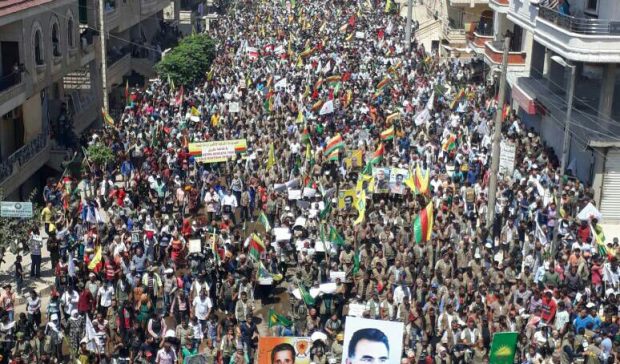Washington Kurdish Institute
On July 5, 2017, large demonstrations took place in the Kurdish city of Afrin in Rojava, western (Syrian) Kurdistan against Turkish-backed military attacks. Earlier this week, shelling by the Turkish military and attacks by Turkish-backed groups within Syria, some fighting under the Free Syrian Army (FSA) banner, resulted in several civilian casualties, and Turkey and its proxies continue to threaten Afrin. Afrin has survived waves of attacks by jihadist terror groups since the beginning of the Syrian civil war and establishment of self-rule in Rojava and northern Syria, and predominantly Kurdish city is currently hosting thousands of internally displaced Syrians of various ethnicities and religions, even as it contends with an economic blockade and military aggression from neighboring Turkey. The most recent attacks and threats come as the Syrian Democratic Forces (SDF), a multi-ethnic military alliance of groups including the People’s Protection Units (YPG) and Women’s Protection Units (YPJ), move forward with their operation to liberate Raqqa, the de facto capital of the areas controlled by the ISIS terrorist organization. As the US-backed Raqqa campaign progresses, Turkey’s Defense Minister has publicly discussed launching an operation targeting Afrin – threatening both a humanitarian crisis for the people of Afrin and internally displaced people living there and a serious distraction in the SDF-led, internationally backed military campaign against ISIS.
There is little reason to think that the people of Afrin, thousands of whom defiantly took to the streets to protest recent aggression, will submit to threats. Rather, Afrin is likely to follow the example of Kobanê, a city now known worldwide for its historic victory against ISIS – a name now synonymous with resolve and resistance. In mid-September 2014, ISIS began its siege of the Kurdish city of Kobanê, located just south of the Turkey-Syria border in the region of Rojava, western (Syrian) Kurdistan. The people of Kobanê and the fighters of the YPG and YPJ resisted ISIS, who advanced on Kobanê, capturing many villages and coming within 15 kilometers of the city of Kobanê itself. The YPG/J resisted against the ISIS terrorists, and their bravery in the face of this existential threat captivated the world.
However, while much of the world hoped for ISIS, who had recently captured Iraq’s second city of Mosul, would be stopped, Turkey was unenthusiastic about Kurdish resistance to ISIS, and watched the battle from the other side of the city’s northern border, seemingly preferring an ISIS victory to any other alternative. In October 2014, Turkish President Recep Tayyip Erdogan famously stated, “Kobanê is about to fall,” but the resistance nonetheless continued and, after 134 days and assistance from the Iraqi Kurdish peshmerga and US-led coalition, the fighters of the YPG/J and allied forces, at great cost, defeated ISIS, handing the terrorist organization its first high profile defeat and shattering ISIS’ air of invincibility following the group’s conquest of large portions of Iraq and Syria.
The aggression of ISIS and other radical jihadist groups against the Kurdish people of Syria is not a nuanced issue, and those who threaten the civilian population of Afrin with destruction will find themselves on the wrong side of history once again, 2 years after they were exposed and humiliated in Kobanê. On one side are those who shelter the displaced and call for gender equality and freedom of religion, and on the other side are the violent murderers, torturers, and advocates slavery, whose dark world view inspire terror attacks far beyond Syria. No understanding should be shown for the sensitivities of those who choose the side of terror. Yesterday’s demonstration is a clear signal that Afrin stands ready to write another chapter in the story of resistance that is the recent history of the people of Rojava. The world powers should not remain silent, and should aid the people of Afrin just as they are aiding the SDF in Raqqa – and punish those who seek to cause them harm.

